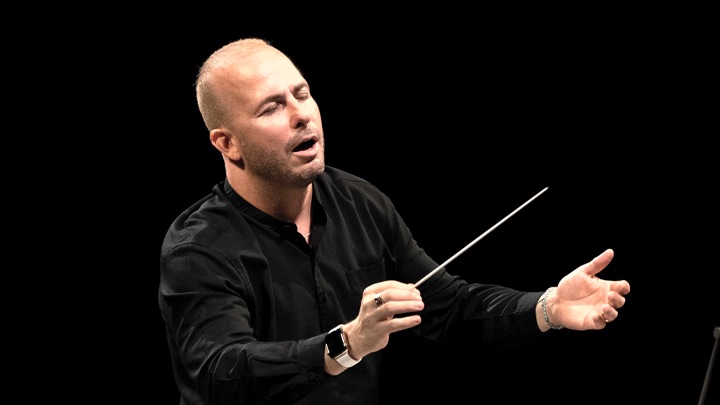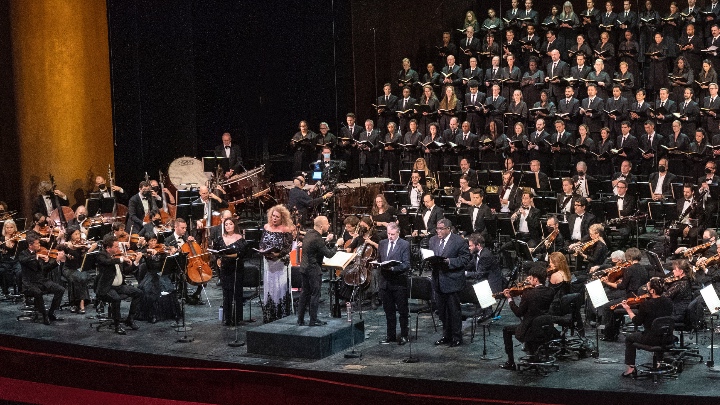The opening week of the Metropolitan Opera’s 2023-2024 season has been very focused on facing mortality, dealing with guilt, and preparing your soul for eternal judgment with the uncertain hope of salvation. Tuesday night opened the season with the Met premiere of Jake Heggie’s Dead Man Walking in which Catholic nun Sister Helen Prejean prepares a condemned prisoner’s soul for repentance, confession, death with the hope of spiritual redemption and salvation. The same existential and religious crises are faced by the four soloists, chorus (and possibly orchestra and conductor?) of Verdi’s monumental Messa da Requiem (1874) which opened with the first of three performances on September 27th. Met music director Yannick Nézet-Seguin led both works on consecutive evenings.
I must be in a spiritual catharsis/religious crisis mood now that summer is definitely over, since I thoroughly enjoyed the whole performance despite several shortcomings in performance and interpretation. One disappointment was the that the program mentioned the Metropolitan Opera’s continued support of the Ukrainian people in their defense of their country and cultural heritage, but did not dedicate the Requiem performances to the late Renata Scotto who we lost on August 16th and who sang this piece (though not at the Met). Hopefully the upcoming run of Madama Butterfly early next year will be dedicated to her memory and redress that.
19th-century conductor and Wagnerite Hans von Bülow shaded Verdi’s late religious masterpiece as “Opera in church dress.” The Requiem can work in a hushed, interior, cerebral way as demonstrated by Teodor Currentzis and musicAeterna in November 2019 when they performed the Requiem at the Shed. That interpretation put the work back into the church despite busy and irrelevant multimedia video by Jonas Mekas.
Nézet-Séguin definitely went for the drama, emphasizing wide and sometimes jolting dynamic contrasts that heightened the inherent melodrama of Verdi’s operatic conception. Each section of the work had a specific rhythm, color, volume and emotional temperature. The danger of this approach was that the Requiem failed to cohere as a totality that climaxes with the shattering catharsis of the “Libera Me.” It seemed a series of disparate musical parts moving one to the other with no overarching structure.
(For those closely following the French-Canadian conductor’s fashion choices – he wore a dress shirt of metallic black fabric with faded gold patterning over black dress slacks. No tie, no jacket. The other soloists wore black tuxedos and long black evening gowns.)
Nevertheless, there was impressive orchestral playing on display from the Metropolitan Opera Orchestra. The Metropolitan Opera Chorus, under the direction of Donald Palumbo (in his last season), acquitted themselves superbly.
The four soloists were a decidedly mixed bag. The best of the quartet was Scottish mezzo-soprano Karen Cargill, who previously impressed me with her Waltraute, Erda, Anna in Les Troyens and Mère Marie in Poulenc’s Dialogues des Carmélites. Her rich and impressively integrated mezzo was firm from top to bottom and from forte to pianissimo and she delivered the music with quiet self-possession. Cargill’s musical and vocal authority anchored both her solo and ensemble numbers with a spiritually centered force.
Ukrainian basso Dmitry Belosselskiy has a rich ample and sonorous tone that was in itself impressive. But his booming bass was deployed with less rhythmic precision and verbal incisiveness than the other vocalists, muting his effectiveness as a musical communicator.
Veteran tenor Matthew Polenzani is an inherently sensitive, refined and musical singer who has sung Verdi’s Alfredo, Don Carlos, Macduff and the Duke of Mantua among his other Met roles. In several of these roles he has been able to summon some spinto tenor force when needed while pleasing with his bel canto finesse.
Though several phrases were shaped attractively, Polenzani’s voice seemed somewhat insecure and recalcitrant on Wednesday night. In softer phrasing (Polenzani’s strong point) the tone could turn a touch dry lacking spin and bloom. Louder declamatory phrases found the voice turning throttled and unsteady with juddering vibrato. The right musical intentions were there but the voice failed to expand and bloom as consistently as one would have wished. Polenzani’s singing wasn’t unattractive or inept – just surprisingly recessive and lacking vocal steadiness and glamor.
Soprano Leah Hawkins, a recent graduate of the Met’s Lindemann Young Artist Development Program with a career steeply on the rise, revealed a budding lirico-spinto soprano that also was handled inconsistently despite superior and appropriate vocal means. This is Hawkins’ biggest Met assignment to date – her previous roles included a radiant Strawberry Woman in Porgy and Bess, Musetta and the Priestess in Aida, etc. She also has a major role in the upcoming new production of X: The Life and Times of Malcolm X later this season. Clearly Maestro Nézet-Séguin has a lot of faith in her present and future to give her such an exposed demanding assignment.
The soprano soloist music in the Requiem requires a lot of sustained floated line at the piano dynamic (check out Montserrat Caballé’s audio and video Requiem performances to hear this done to a turn by a virtuoso). Hawkins pulled her tone back into a rather recessed vocal placement resulting in a bottled tone that shaded flat in pitch and lacked spin and release. This technical approach caused her to come to grief in the most exposed high phrase in the “Recordare” duet which emerged scrambled in tone and pitch. This was a momentary blemish though and could be attributed to first-night nerves and inexperience.
However, Hawkins did deliver the goods in the “Libera Me” where she could sing out more expansively and dip into her middle and chest voice with abandon. It was a brave and vocally generous reading which was full of fervor and emotional tension amply demonstrating Hawkins’ potential as a Verdi soprano. However, I think a touch of bel canto control and finesse is prescribed and it is a shame that a Florence Page Kimball or Beverly Johnson isn’t available to give Hawkins the ultimate technical polish that her talent deserves. I am curious to hear if and how she improves in the two remaining performances this Friday and Saturday. One wants to hear this bright young talent move forward and upward.
One got a sense that the Met and the maestro directed most of the rehearsal and preparation toward the opening night premiere of the Heggie opus while Verdi’s Requiem was thrown together quickly with less exacting care and attention. Hopefully things will settle in with repetition later this week.
The whole on Wednesday night was greater than the sum of the uneven parts due to the commitment of Maestro Nézet-Séguin and the high level of the Met orchestra and chorus which swept all before them. Verdi’s genius had not a little to do with it.
Photo: Richard Termine




